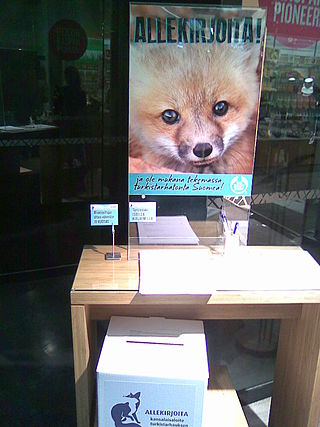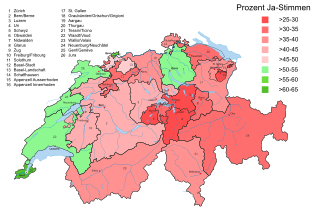
A popular initiative is a form of direct democracy by which a petition meeting certain hurdles can force a legal procedure on a proposition.
Voting in Switzerland is the process by which Swiss citizens make decisions about governance and elect officials. The history of voting rights in Switzerland mirrors the complexity of the nation itself. The polling stations are opened on Saturdays and Sunday mornings but most people vote by post in advance. At noon on Sunday, voting ends and the results are usually known during the afternoon.
Ten referendums were held in Switzerland during 2008. The first two were held on 24 February on business tax reform and aircraft noise. A further three were held on 1 June on public information campaigns, naturalisation and health reform. The final five were held on 30 November on legalising cannabis, making the pension age flexible, restricting the right of appeal of associations against construction projects, amending the constitutional article on narcotics and eliminating the statute of limitations with respect to pornographic crimes against children.
Eight referendums were held in Switzerland during 2009. The first was held on 8 February on extending the freedom of movement for workers from Bulgaria and Romania. The next two were held on 17 May 2009 on introducing biometric passports and the "Future with complementary medicine" proposal. A further two were held on 27 September on increasing VAT and the introduction of public initiatives. The final three were held on 29 November on banning the construction of new minarets, exporting weapons and the use of aviation fuel taxation.
Six referendums were held in Switzerland during 2010; three in March on pension funds, animal protection and a constitutional amendment, one in September on unemployment benefits, and two in November on deporting foreign criminals and introducing a canton tax.

A referendum was held in Switzerland on 13 February 2011 on the federal popular initiative "For the protection against gun violence". It was rejected by 56% of voters and a majority of cantons.
Twelve national referendums were held in Switzerland during 2012. On 11 March voters across the country were asked five questions on employment leave, second houses, building society savings, the Fixed Book Price Agreement and gambling revenues. On 17 June there were three questions on healthcare, foreign policy and home buying. On 23 September there were three on a smoking ban, secure housing in old age and music lessons at school. A final referendum was held on 25 November on the Animal Diseases Act.
A four-part referendum was held in Switzerland on 11 May 1884. All four were rejected by voters.
Five referendums were held in Switzerland in 1891. The first was held on 15 March on a federal law on federal officials who had become unemployable due to disability, and was rejected by 79.4% of voters. The second was held on 5 July on a constitutional amendment, and was approved by 60.3% of voters. Two referendums were held on 18 October, one on revising article 39 of the federal constitution and one on a federal law on Swiss tariffs; both were approved. The last was held on 6 December on the question of whether the federal government should purchase the Swiss Central Railway, but was rejected by 68.9% of voters.
A referendum on federal salaries was held in Switzerland on 28 May 1933. Voters were asked whether they approved of a federal law that would lower the salaries of federal officials on a temporary basis. The proposal was rejected by 55.1% of voters.
Four referendums were held in Switzerland during 1903. The first was held on 15 March on a federal law on tariffs, and was approved by 59.6% of voters. The second, third and fourth were all held on 25 October concerning an amendment to the federal criminal law, a popular initiative on Swiss residents electing the National Council and an amendment to article 32bis of the constitution. All three were rejected by voters.
Five referendums were held in Switzerland during 1929. The first three were held on 3 March on the issues of grain supply and a federal law on tariffs. The counter-proposal to the grain supply question and the tariffs law were both approved. The fourth and fifth referendums were held on 12 May on popular initiatives on road traffic and banning spirits. Both were rejected by voters.
Six referendums were held in Switzerland during 1938. The first four were held on 20 February; the first on amending articles 107 and 116 of the constitution to make Romansch an official language, which was approved by over 90% of voters and all cantons. The second was on a popular initiative "on urgent federal resolutions and the protection of people's rights" and was rejected by 85% of voters. The third was on a popular initiative on the private arms industry, and was also rejected by a wide margin, whilst the fourth was on a counter-proposal to the arms industry question, and was approved by voters. The fifth referendum was held on 3 July on the penal code, and was approved. The sixth and final referendum of the year was held on 27 November on a federal resolution on the transient order of the federal budget, and was approved by 72% of voters.
Four referendums were held in Switzerland during 1939. The first two were held on 22 January on a popular initiative on civil rights and a federal resolution on the restricted use of the urgency clause in the constitution. The third was held on 4 June on a constitutional amendment regarding the funding for government policies on defence and unemployment, and was approved by voters. The fourth was held on 3 December on a federal law on the employment status and insurance for federal civil servants, and was rejected by voters.

A popular initiative allows people to suggest laws on a national, cantonal, and municipal level.
Twelve national referendums were held in Switzerland during 2014.

In Switzerland, the federal popular initiative "against mass immigration" was a referendum that aimed to limit immigration through quotas, as it had been prior to the bilateral treaties between Switzerland and the European Union (EU) launched in 2002.
Thirteen national referendums were held in Switzerland during 2016.
Several federal referendums were held in Switzerland in 2020, with voting on 9 February, 27 September and 29 November. Voting was also planned for 17 May, but was postponed due to the COVID-19 pandemic.
Federal referendums were held in Switzerland on 7 March, 13 June, 26 September, and 28 November 2021. Swiss referendums take three forms: popular initiatives, which are citizen proposals to create a new law and require 100,000 valid signatures on a petition to get on the ballot; facultative or optional referendums, which are citizen proposals to approve or reject a piece of existing law and require 50,000 valid signatures on a petition to get on the ballot; and mandatory referendums, which are required to revise the constitution, join an international organisation or introduce emergency federal legislation for over a year.




